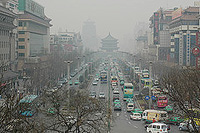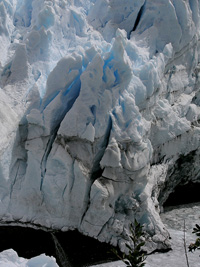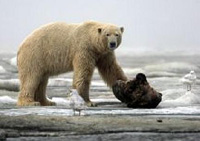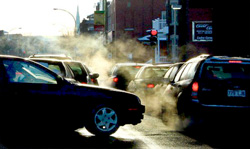Whether in coal, oil, or gas, carbon is an essential ingredient of all fossil fuels.
When these fuels are burned to provide energy, carbon dioxide (CO2), a prime greenhouse gas, is released into Earth's atmosphere. Utility facilities account for 40% of the greenhouse gases; as does the 40% from the transportation sector. This kind of change is imperative for our continued well-being on this planet.
 Fossil fuels burned to power cars and trucks, heat homes and businesses, and power factories are accountable for about 98% of America's CO2 emissions, 24% to methane emissions and 18% of nitrous oxide emissions (NOx).
Fossil fuels burned to power cars and trucks, heat homes and businesses, and power factories are accountable for about 98% of America's CO2 emissions, 24% to methane emissions and 18% of nitrous oxide emissions (NOx).
CC, with its ultra-low sulfur properties, burns cleaner and at a higher energy content, which results in less consumption equaling higher miles per gallon. It generates a "carbon neutral" diesel displacing extra, imported fossil crude.
 The facts are irrefutable: The thermo-haline ocean current—which moderates temperatures worldwide, and prevents Europe from having a harsh climate similar to Alaska—is slowing.
The facts are irrefutable: The thermo-haline ocean current—which moderates temperatures worldwide, and prevents Europe from having a harsh climate similar to Alaska—is slowing.
Glaciers in Greenland, Alaska, the Himalayas, and the Antarctic Peninsula are retreating. Sea ice in the Arctic Ocean during summer is clearly fading.
One of the most forbidding environments in the world, the Arctic, is home to theUrsus Maritmus polar bear. During the summer, these animals roam this region on large chunks of floating ice, drifting for hundreds of miles. This is how they find mates and hunt for seals, fattening themselves to prepare for the severe winter. If these palettes of floating ice did not exist, the polar bear would not survive.
Recent reports indicate more and more are drowning as the sea margins expand, scientists and climatologists believe that the projected decreases in the polar sea ice due to global warming will have a significant negative impact or even lead to extinction of this species within this century.
 Within the past three decades, more than one million square miles of sea ice—an area the size of Norway, Denmark, and Sweden combined—has vanished.
Within the past three decades, more than one million square miles of sea ice—an area the size of Norway, Denmark, and Sweden combined—has vanished.
Presently, ice at the southern Arctic region of the polar bear's range, is melting at an accelerated pace three weeks sooner than it had previously. This affords the bears less time to hunt, eat, and store fat for the brutal winter. Due largely to this new early melting, the Hudson Bay polar bear population has declined by 14% during the past ten years.
A time of epic destruction—worse than any other in the history of mankind—is certain to come. Undoubtedly, the ensuing effects of rampant land, sea and air pollution will play a severe role in these events; to what degree, remains to be seen. Global warming due to burning carbon and fossil fuel does, in fact, pose a real danger to mankind.
 Sulfur = asthma
Sulfur = asthma- Nox = lung disease - emphysema
- CO = heart and circulatory - cancer
Will humankind be able to find a solution?
Or, alternatively, will it lead to cataclysmic events.
The facts are irrefutable. . .
 It is also an enormous business opportunity. New and unique sources of solar, wind, bioenergy, waste-to-fuel technologies, present fresh avenues of revenue to rural as well as urban communities. Earnestly addressing environmental redirection provides opportunities to move toward cleaner, healthier forms of alternative energy. But all the optional choices of fuel will not help the final solution if we do not begin to curb our overall consumption of the planet's energy; sending pollutants skyward and downward.
It is also an enormous business opportunity. New and unique sources of solar, wind, bioenergy, waste-to-fuel technologies, present fresh avenues of revenue to rural as well as urban communities. Earnestly addressing environmental redirection provides opportunities to move toward cleaner, healthier forms of alternative energy. But all the optional choices of fuel will not help the final solution if we do not begin to curb our overall consumption of the planet's energy; sending pollutants skyward and downward. Fossil fuels burned to power cars and trucks, heat homes and businesses, and power factories are accountable for about 98% of America's CO2 emissions, 24% to methane emissions and 18% of nitrous oxide emissions (NOx).
Fossil fuels burned to power cars and trucks, heat homes and businesses, and power factories are accountable for about 98% of America's CO2 emissions, 24% to methane emissions and 18% of nitrous oxide emissions (NOx). The facts are irrefutable: The thermo-haline ocean current—which moderates temperatures worldwide, and prevents Europe from having a harsh climate similar to Alaska—is slowing.
The facts are irrefutable: The thermo-haline ocean current—which moderates temperatures worldwide, and prevents Europe from having a harsh climate similar to Alaska—is slowing. Within the past three decades, more than one million square miles of sea ice—an area the size of Norway, Denmark, and Sweden combined—has vanished.
Within the past three decades, more than one million square miles of sea ice—an area the size of Norway, Denmark, and Sweden combined—has vanished. Sulfur = asthma
Sulfur = asthma